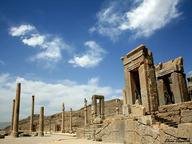Quiz Answer Key and Fun Facts
1. When last we left off (see the quiz 'Persian Empire, Part I') Cyrus had just conquered Babylon (in 539 B.C.), greatly expanding his empire. Persia inherited which two areas following this conquest?
2. The founder of the Persian Empire, Cyrus the Great, died in battle in 530 B.C. fighting against which people of central Asia?
3. Cambyses was the second Persian Emperor, succeeding his father Cyrus after the latter's death in battle. Before succeeding to the throne however, Cambyses had his own brother put to death. What was this brother's name?
4. What was undoubtedly the greatest accomplishment of Cambyses' reign?
5. Darius, the next Persian Emperor following Cambyses, began his reign by putting down the revolt of which usurper to the throne?
6. During his reign, Darius made several great conquests, and brought the Persian Empire to its greatest extent. However, in terms of warfare Darius is probably best known for which great loss inflicted by the Greeks?
7. Which of these rivers did not form a border (at least in part) for the Persian empire, at its greatest extent (during the reign of Darius)?
8. Who was the son of Darius, ascending to the throne at Darius's death in 485 B.C.?
9. True or false: Athens was captured and burned by the Persians.
10. I'm going to skip a great deal of time now to ask this final question, that is...who was the last emperor of Persia, just prior to its final defeat by Alexander the Great in 330 B.C.?
Source: Author
thejazzkickazz
This quiz was reviewed by FunTrivia editor
nerthus before going online.
Any errors found in FunTrivia content are routinely corrected through our feedback system.
